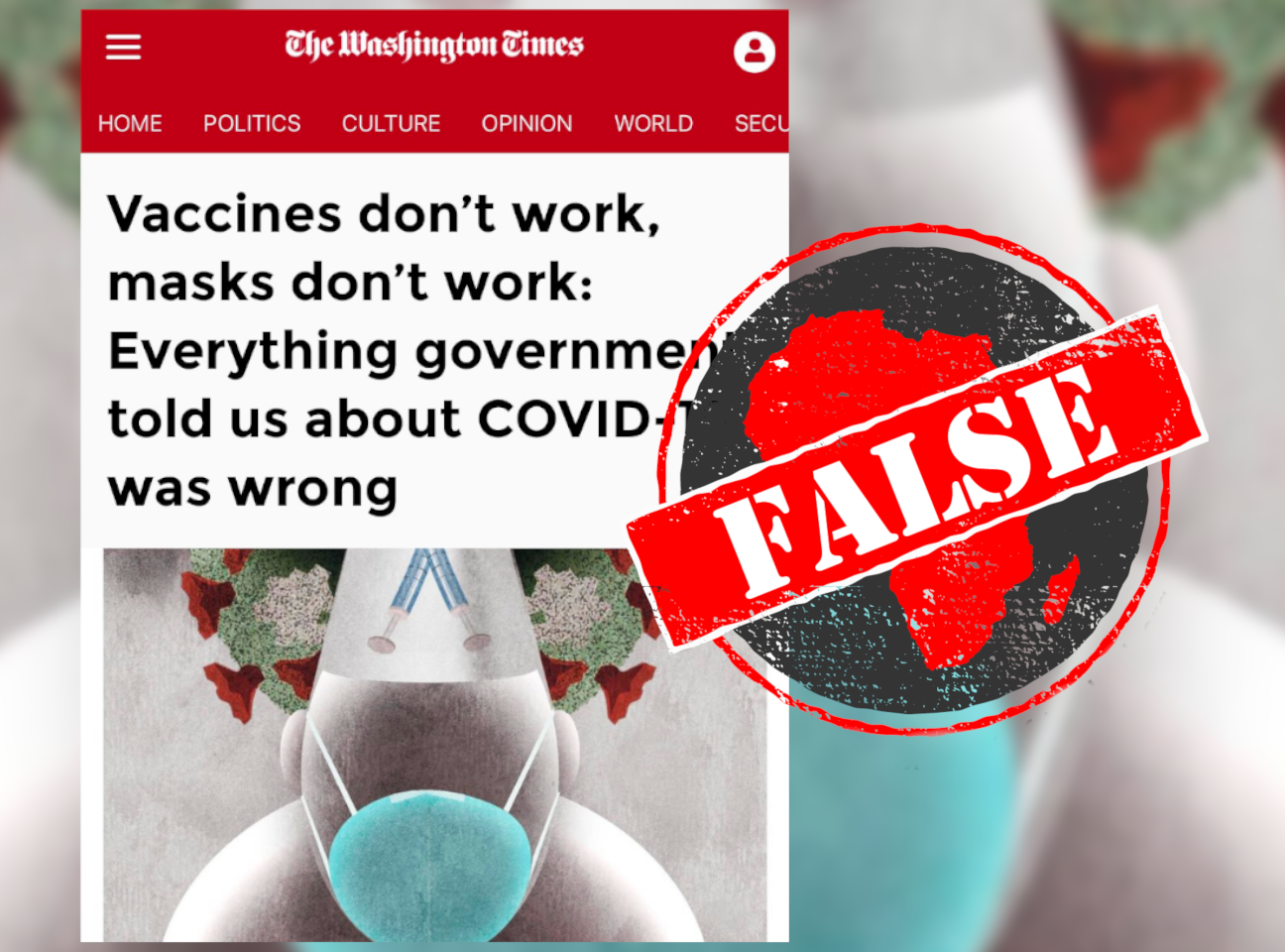IN SHORT: A screenshot of an article claiming that “everything government told us about Covid-19 was wrong” is spreading on social media. But it was published by a website known to peddle misinformation and is being reposted by social media accounts previously debunked by fact-checkers.
A screenshot of a news headline has been posted to Twitter, and liked and reposted thousands of times.
The screenshot appears to show the headline of an article published by the “Washington Times”. It reads: “Vaccines don’t work, masks don’t work: Everything government told us about Covid-19 was wrong.”
It was posted by “Dr. Anastasia Maria Loupis”, who describes herself as “½ Viking, ½ Philosopher, Doctor of Medicine (MD)” and is, according to her Twitter bio, based in Copenhagen, Denmark. The account has over 317,000 followers.
The account has posted other claims that have been debunked by fact-checking organisations.
Africa Check found other instances of the Washington Times screenshot posted to Facebook and doing the rounds in South Africa, also here, here, here and here.
We found the original article in the screenshot, but is it credible? And is it true that “vaccines and masks don’t work”? We investigated.

The Washington Times and it’s connection to the ‘Moonies’
The article is hidden behind a paywall, requiring a subscription to read beyond the opening sentences, which are: “Remember when the federal government told you masks were effective against Covid-19? Yeah, they’re not.”
However, the Washington Times is considered a questionable source for its bias and lack of credible sources.
The website has a “long record of hyped stories, shoddy reporting and failure to correct errors”, according to the Southern Poverty Law Center, a nonprofit legal advocacy organisation specialising in civil rights in the US.
The Washington Times was established in 1982 by Sun Myung Moon, the founder of the Unification Church, a religious movement.
The Unification Church, originating in South Korea, has been controversial for years, with some describing it as a cult. Members of the church are often referred to as “Moonies”, a play on founder Moon’s surname.
But what about the claim that masks and vaccines don’t work?
Masks do work, most effective in combination with other preventative measures
South African president Cyril Ramaphosa announced, on 23 March 2020, that the country would go into the first lockdown, aimed at reducing the spread of the Covid-19 virus.
Like elsewhere across the world, with the coronavirus pandemic came the regulation of the use of face masks. At various points between March 2020 and June 2022 the wearing of masks in public in South Africa was mandatory.
Africa Check previously checked whether masks were necessary in the fight against the virus. We found that masks are most effective when worn by sick people and by those caring for the sick.
Africa Check also found that not all types of masks are equal in protecting against the spread of the virus, but any mask is still better than no protection.
Many studies have shown that masks do work, and have been essential in limiting the spread of the coronavirus since the outbreak. Face masks work best in combination with other effective measures, such as getting vaccinated.
But since it is no longer mandatory to wear face masks, should you still wear one to help control Covid-19 transmission?
The US Centers for Disease Control and Prevention (CDC) in September 2022 still recommended masks for crowded places like public transport, and for those who have a high risk for getting very sick with the coronavirus.
Experts in February 2023 also still suggest that masks be worn in poorly ventilated places, like in a crowded theatre.
Vaccines effective: limit serious illness, hospitalisation and death
The social media posts sharing the Washington Times screenshot also claim that vaccines “don’t work”, but like the claim that masks don’t work, this is false.
The World Health Organization (WHO) says that the benefits of being vaccinated against the coronavirus include protection from serious illness, hospitalisation and death.
There is also evidence that you are less likely to transmit the virus to others if you’re vaccinated against Covid-19.
The claim that vaccines aren’t effective has been debunked before and there is plenty of evidence that shows the effectiveness of Covid-19 vaccines in reducing hospitalisations and deaths.
One study, published in 2021 in the New England Journal of Medicine, found that transmission between a vaccinated person and their unvaccinated family was around 40% to 50% lower than in households where all family members were unvaccinated.
Some public health advice was adjusted as the Covid-19 pandemic progressed, as scientists learnt more about the virus, and as vaccines became available. However, the claim that “Vaccines don’t work, masks don’t work: Everything government told us about Covid-19 was wrong” is simply not true.
Republish our content for free
For publishers: what to do if your post is rated false
A fact-checker has rated your Facebook or Instagram post as “false”, “altered”, “partly false” or “missing context”. This could have serious consequences. What do you do?
Click on our guide for the steps you should follow.
Publishers guideAfrica Check teams up with Facebook
Africa Check is a partner in Meta's third-party fact-checking programme to help stop the spread of false information on social media.
The content we rate as “false” will be downgraded on Facebook and Instagram. This means fewer people will see it.
You can also help identify false information on Facebook. This guide explains how.





Add new comment